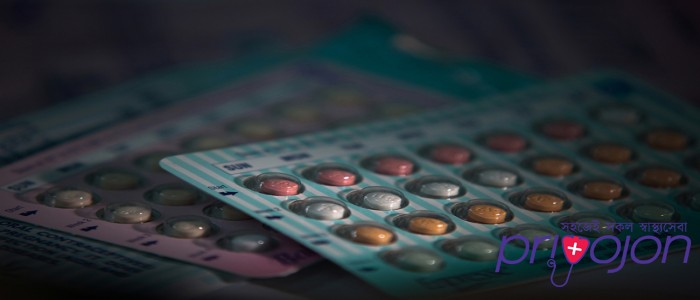
Overview
Medically reviewed by Dr. Rabeya Afroz Shomi
What is the treatment?
How is that the treatment done?
Who is eligible for the treatment?
Who isn't eligible for the treatment?
Are there any side effects?
What are the post-treatment guidelines?
How long does it fancy recover?
Are the results of the treatment permanent?
What are the alternatives to the treatment?
What is the treatment?
Birth control pills are basically a kind of hormonal contraception that forestalls sexually active females from getting pregnant. they're an efficient thanks to control pregnancy and that they are generally taken orally . contraception pills are generally prescribed by a doctor after a consideration of varied factors like menstrual symptoms, cardiovascular health, whether a lady is breastfeeding, whether an individual is affected by any chronic condition or if the person is on the other medication.
There are differing types of contraception pills. Combination pills contain synthetic sorts of estrogen and progestin and most of such pills are active in each cycle. the various sorts of combination pills are monophasic pills, multiphasic pills and extended-cycle pills. Monophasic pills contain an equivalent dose of hormones and are utilized in one-month cycles. Multiphasic pills are also utilized in monthly cycles but they supply different levels of hormones. an individual on either of those pills has got to take inactive pills during the last week and have her periods. Extended cycle pills cause an individual to possess period only 3-4 times a year as they're generally utilized in 3-week cycles.
Another sort of contraception pill is understood because the mini-pill or progestin-only pill. This medication is usually employed by women who cannot take estrogen for a few reason. All cycles are active when this pill is employed . Do to the paucity of inactive pills, a lady even might not experience periods when she is on this medication.
How is that the treatment done?
Pregnancy in women occurs when a man’s sperm fertilizes an egg released from the ovary of the lady . This embryo develops into a baby after it gets nourished within the woman’s uterus. the whole process of releasing the egg from the ovary and preparing the body to simply accept the embryo is regulated by hormones. The man-made estrogen and progestin hormones present in birth-control pills work together to inhibit the body’s natural cyclical hormones and thus, help to stop pregnancy. There are variety of the way by which pregnancy is avoided. contraception pills may cause a woman’s body to prevent ovulating or they'll also help to vary the cervical mucus so on make it difficult for the sperm to travel through the cervix and impregnate an egg. contraception pills can also change the liner of the womb and make it difficult for the embryo to urge implanted and hence, prevent pregnancy.
Another sort of contraception pill is that the extended-cycle pill. They contain an equivalent hormones as other contraception pills but the hormones are appropriated a extended period of your time . This pill is usually taken continuously for a period of 12 weeks and this drastically reduces the amount of periods that a lady normally experiences during a year. an individual is usually alleged to take one week of inactive pills after the 12-week cycle.
Who is eligible for the treatment?
Birth control pills are a highly effective way of avoiding getting pregnant. Women who are sexually active but don't want to urge pregnant are eligible to use contraception pills. As they pills help to manage the cycle , this pill is useful for ladies affected by heavy or irregular periods. Progestin-only pills are good for ladies who are intolerant to estrogen, smoke, older than 35 years, need to breastfeed or have a history of blood clots.
Who isn't eligible for the treatment?
As the effects of contraception pills are fully reversible, women who want to permanently avoid pregnancy aren't eligible to use these pills. Progestin-only pills might not work so well during a woman who doesn't have a known intolerance to estrogen therapy. Similarly, women who need to breast-feed, are older than 35 years or who cannot handle estrogen therapy aren't eligible to use combination pills.
Are there any side effects?
The side-effects of contraception pills include weight gain, sore or swollen breasts, nausea, lighter periods, small amounts of blood in between periods and mood changes. the bulk of those symptoms aren't so serious. a number of the less common but more serious side effects include abdominal pain, headaches, eye problems, pain and swelling or aching within the legs and thighs.
What are the post-treatment guidelines?
There are not any such post-treatment guidelines. a lady has got to adhere to the cycle of the contraception pill that she is using. Combination pills can follow a 21-day, a 24-day or 28-da cycle while extended pills follow a 91-day cycle. a lady has got to take one pill everyday to avoid getting pregnant. a lady can get pregnant after she stops taking such pills.
How long does it fancy recover?
A woman may get pregnant albeit she misses one pill that she is meant to require . The results of birth-control pills are fully reversible and ladies can get pregnant once they discontinue the medication. Thus there's no recovery period for consuming birth-control pills.
Are the results of the treatment permanent?
Birth control pills prevent a lady from getting pregnant once they are consumed regularly. However, its effects are fully reversible and a lady can get pregnant by discontinuing the consumption of such pills. Hence, the results aren't permanent.
What are the alternatives to the treatment?
A woman who doesn't wish to urge pregnant can choose alternative treatment within the sort of contraception patch, contraception implant, contraception shot, vaginal ring, sponge or contraceptive . a lady also can use a female condom, diaphragm or an intra-uterine device. Surgical methods like tubal litigation and vasectomy also are highly effective in contraception .
